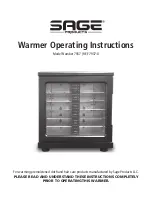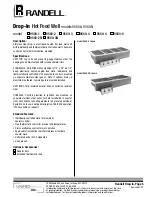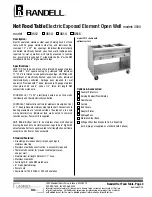
6
SERVICE / REPAIR
NOTE: THIS APPLIANCE MUST BE SERVICED ONLY BY AN AUTHORIZED AGENT.
NOTE:
Parts protected by the manufacturer or his agent are not to be adjusted by the
installer, unless the installer is an authorized service agent.
To protect warranty coverage, use only genuine APW Wyott Foodservice replacement parts. Use
of replacement parts not supplied by the manufacturer will void the warranty. To find items you
want to order from the part list, proceed as follows.
1.
Refer to the exploded views to identify the part you need and its corresponding item number.
2.
Using the Parts List, determine the description and part number of the part.
3.
The parts distributor has a price list of parts and can quote cost of parts on order. When a
parts order is placed, be prepared to provide the unit’s model number and serial number in
addition to the part description and part number.
If you have any questions or problems contact your nearest APW/Wyott
Service Representative.
TROUBLESHOOTING
Troubleshooting requires accurate identification of the problem, determination of the
cause of the problem and the correct action is taken to repair the unit. This guide may
not address all possible problem situations. If the problem cannot be corrected, con-
tact the service representative and be prepared to give him the unit’s model number
and serial number.
THIS UNIT OPERATES ON 120 VOLTS.
DO NOT
ATTEMPT ANY ELECTRICAL REPAIRS UNLESS YOU ARE
QUALIFIED TO DO SO AND HAVE THE PROPER DIAGNOSTIC EQUIPMENT.
NEVER
PERFORM ELECTRI-
CAL REPAIRS WHEN THE UNIT IS CONNECTED TO THE AC LINE.
WARNING
!
7
PROBLEM
PROBABLE CAUSE
REMEDY
Unit fails to operate.
No power.
Make sure power switch on ON
and power cord is plugged into
a working outlet.
Faulty Power cord (item 50).
120 Volt line terminal of power
switch should have 120 VAC
when unit is plugged in. If not,
disconnect cabinet from power
outlet and replace power cord.
Door left open.
Ensure door is completely
closed when in operation.
Door gasket is worn.
Replace door gasket.
Latch plate is out of adjustment
(Item 37).
Readjust latch plate according
to door adjustment procedure.
Door hinges out of adjustment
(Item 36)
Refer to Door Adjustment pro-
cedure to adjust hinges.
Temperature set too low.
Refer to the Adjusting Air and
Water Temperature instruc-
tions.
Holding temperature too high.
Temperature set too high.
Refer to Adjusting Air Tem-
perature instructions.
Holding temperature too low.
Holding temperature too high
but display shows low tem-
perature.
Thermocouple leads reversed
at circuit board.
Disconnect unit from line
power.
CAUTION:
Failure to
do so may result in electric
shock. Exchange lead connec-
tions.
Latch does not open door.
Strike plate upside down.
Make certain that strike plate is
installed long end down, slots
facing out.
Door does not latch.
Latch too far from strike plate.
Loosen latch screws in door.
Hold door closed and move
latch until it contacts strike
plate. Retighten screws.
Door hinges do not rest on
cabinet hinges (door too high).
Hinge collars installed improp-
erly
Remove door. Pry collars from
sockets. Sloped side of hinge
collar must face door edge.
Reassemble in reverse order.
TROUBLESHOOTING
























